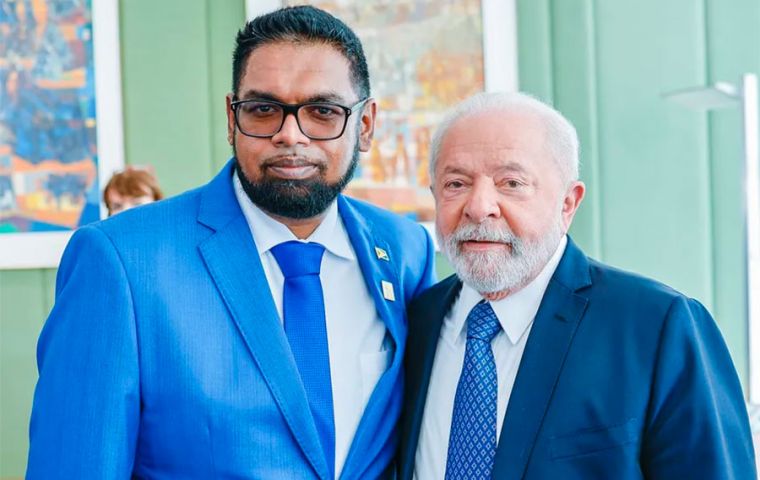MercoPress. South Atlantic News Agency
Brazilian diplomacy manages to cool tensions between Venezuela and Guyana
 Nicolas Maduro and Guyana elected president held a first meeting, over the disputed region in the Grenadines which currently holds the chair of Celac, Community of Latin American and Caribbean States
Nicolas Maduro and Guyana elected president held a first meeting, over the disputed region in the Grenadines which currently holds the chair of Celac, Community of Latin American and Caribbean States In what is considered a success for Brazilian diplomacy, Venezuela and Guyana pledged in a joint statement last Thursday, not to resort to force to settle a long-standing dispute over contested land and adjoining sea in an oil and gas-rich region known as the Essequibo.
The two neighboring countries to the north of South America, “directly or indirectly will not threaten or use force against one another in any circumstances, including those consequential to any existing controversies between the two states,” the joint statement announced in the Caribbean nation of Saint Vincent and Grenadines pointed out.
Venezuela's Nicolas Maduro and Guyana elected president Irfraan Ali held a first meeting, following on mutual accusations over the disputed region in the Grenadines which currently holds the chair of Celac, Community of Latin American and Caribbean States. The Caribbean island president Ralph Gonsalves presented a nine point statement allegedly coordinated and shared by both sides.
None of the two countries involved in what is considered as another escalating potential armed confrontation agreed on the essence of the matter, that is how to settle the territorial dispute, but convened in the need to lower tensions, following on Brazilian diplomatic mediation, particularly warning Maduro of any 'adventure' in trying to recover the Esequibo, which it considers part of its territory going back to colonial times.
Gonsalves who read the nine-points statement said that both sides pledged to resolve the dispute in accordance with international law, and were committed “to pursue good neighborliness, peaceful coexistence and the unity of Latin America and the Caribbean”.
The two sides also convened on a mechanism to avoid incidents and tensions and would meet again in three months in Brazil, whose president Lula da Silva allegedly played a decisive role in the situation.
The region in dispute covers some 160,000 square kilometers, two thirds of Guyana territory, with dense tropical jungle and sparsely populated but is rich in minerals and particularly hydrocarbons inland and offshore. And so much oil that US Exxon drilling offshore has helped turn Guyana, one of the poorest nations in South America into the fastest growing economy globally according to the World Bank.
Maduro last 3 December organized a controversial referendum in which according to Caracas 95% of voters supported Venezuela's claim of the Essequibo now. But as with Venezuelan affairs there was no indication of turnout at the ballot, besides Maduro and his dictatorial regime are facing elections next year, and for the first time, a woman Corina Machado as head of the opposition in leading opinion polls.
Based on the referendum mandate, Maduro then started legal announcements to create the Venezuela province of Esequibo and instructed the country's oil corporation to begin issuing exploration and extraction licenses. Guyana's president Ali insisted that the case should be resolved at the International Court of Justice.
Brazil extremely aware, (and suspicious of foreign temptations) regarding the significance of the Amazon basin, bordering Venezuela and Guyana, was quick to intervene and pragmatic veteran president Lula da Silva sent a very strong message.
“If there is one thing we don't want in South America it's war”. He added “we have been following the development of the Essequibo issue with growing concern; ”we don't need conflict. We need to build peace.”.
Guyana also counts with the support from OAS, the Caribbean nations Caricom, US and Canada.




Top Comments
Disclaimer & comment rulesCommenting for this story is now closed.
If you have a Facebook account, become a fan and comment on our Facebook Page!